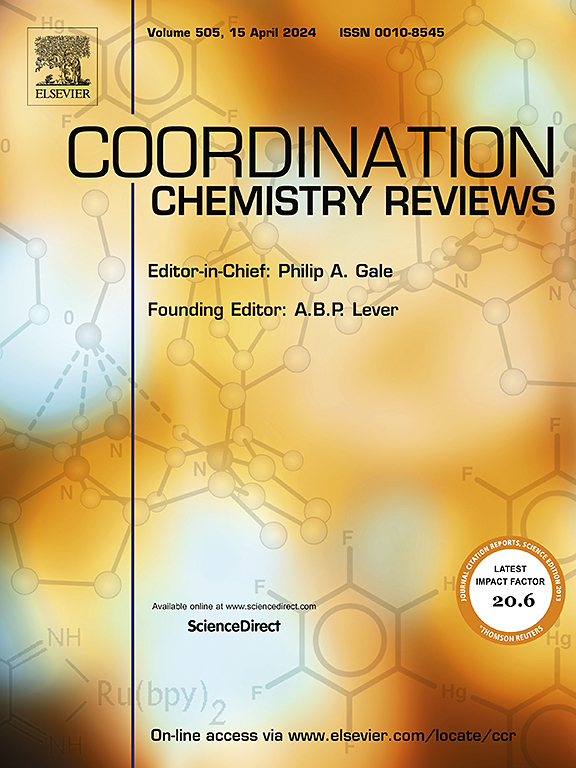Chemically stable Cr-based metal-organic frameworks: Preparation, functionalization, and applications in catalysis in liquid-phase and proton conductivity
IF 20.3
1区 化学
Q1 CHEMISTRY, INORGANIC & NUCLEAR
引用次数: 0
Abstract
Recently, metal-organic frameworks (MOFs) have attracted much attention because of their potential applications in various fields. However, one of the drawbacks of MOFs is low stability, compared with that of inorganic porous materials like zeolites and carbonaceous materials. Cr-based MOFs, especially those composed of Cr3+ and carboxylates, are highly attractive thanks to their high chemical stability, particularly in acid conditions. In this review, the recent approaches to the synthesis of Cr-MOFs (especially via post-synthetic modifications), modification of Cr-MOFs, and application of Cr-MOFs in catalysis in the liquid phase, adsorption, and proton conduction will be discussed. Rather than analyzing the whole reported results on Cr-MOFs, some modifications and applications that are relevant to “chemically stable Cr-MOFs”, together with some special syntheses, will be discussed. In the last part, outlooks of the Cr-MOFs in the relevant fields will be provided to readers, after a summary of the chemically stable Cr-MOFs.

化学稳定的cr基金属有机骨架:制备、功能化及其在液相催化和质子电导率中的应用
近年来,金属有机骨架(MOFs)因其在各个领域的潜在应用而备受关注。然而,与沸石和碳质材料等无机多孔材料相比,mof的缺点之一是稳定性低。cr基mof,特别是由Cr3+和羧酸盐组成的mof,由于其高化学稳定性,特别是在酸性条件下,具有很高的吸引力。本文综述了近年来Cr-MOFs的合成方法(特别是合成后改性)、改性方法以及在液相催化、吸附和质子传导等方面的应用。本文将讨论一些与“化学稳定的cr - mof”相关的修饰和应用,以及一些特殊的合成方法,而不是分析所有已报道的cr - mof的结果。最后,在对化学稳定的Cr-MOFs进行总结之后,对相关领域的Cr-MOFs进行展望。
本文章由计算机程序翻译,如有差异,请以英文原文为准。
求助全文
约1分钟内获得全文
求助全文
来源期刊

Coordination Chemistry Reviews
化学-无机化学与核化学
CiteScore
34.30
自引率
5.30%
发文量
457
审稿时长
54 days
期刊介绍:
Coordination Chemistry Reviews offers rapid publication of review articles on current and significant topics in coordination chemistry, encompassing organometallic, supramolecular, theoretical, and bioinorganic chemistry. It also covers catalysis, materials chemistry, and metal-organic frameworks from a coordination chemistry perspective. Reviews summarize recent developments or discuss specific techniques, welcoming contributions from both established and emerging researchers.
The journal releases special issues on timely subjects, including those featuring contributions from specific regions or conferences. Occasional full-length book articles are also featured. Additionally, special volumes cover annual reviews of main group chemistry, transition metal group chemistry, and organometallic chemistry. These comprehensive reviews are vital resources for those engaged in coordination chemistry, further establishing Coordination Chemistry Reviews as a hub for insightful surveys in inorganic and physical inorganic chemistry.
 求助内容:
求助内容: 应助结果提醒方式:
应助结果提醒方式:


